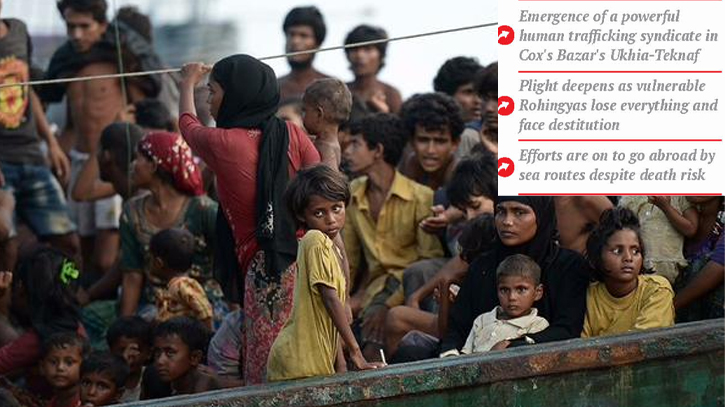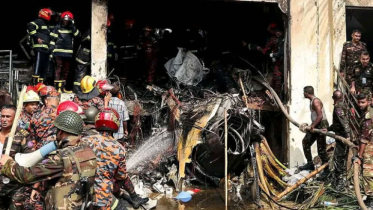
Photo : Collected
Although more than five thousand cases of human trafficking remain pending, individuals from Bangladesh continue embarking on perilous journeys abroad through human trafficking routes braving the risks of death.
Despite the inherent dangers associated with these routes, a significant number of people consciously choose to undertake such treacherous journey, which is a widely acknowledged reality.
The Coast Guard reports that a considerable number of individuals are venturing overseas by sea, fully aware of the potential threats to their lives. This phenomenon is not exclusive to the citizens of our country; even Rohingyas are actively seeking to escape and pursue opportunities abroad, further compounding the gravity of the situation.
Intelligence reports consistently emphasize that the predominant avenue for human trafficking is the sea route, where a substantial number of fatalities occur. Despite the gravity of these incidents, a significant hindrance to justice lies in the numerous pending cases related to human trafficking, surpassing 5000, distributed across various courts in the country.
A critical challenge in the legal process is the scarcity of witnesses in many of these cases. The absence of key testimony hampers the progression of legal proceedings, resulting in protracted delays. As a consequence, these cases linger in the judicial system for years, exacerbating the frustration and anguish for those seeking justice and accountability.
According to diverse sources, the network of smugglers is pervasive across the country, targeting vulnerable groups such as impoverished teenagers, young women, as well as abandoned women and children. Recently, tragedy struck when a trawler bound for Malaysia through the Bay of Bengal sank, resulting in the unfortunate deaths of five individuals, including men, women, and children. In a commendable rescue effort, the Coast Guard managed to save approximately 50 people from this perilous incident.
Following their rescue, the Coast Guard revealed that a formidable human trafficking syndicate has taken root, primarily centered around the 34 Rohingya camps in Ukhia-Teknaf of Cox's Bazar. This criminal network continues to specifically target Rohingya individuals, perpetuating a cycle of exploitation and endangerment for those seeking better opportunities abroad.
The Coast Guard has disclosed that two individuals trafficked on this route, Zainal and Rabeya, revealed that a considerable number of people from Noakhali have successfully migrated to European countries, particularly Australia and Germany. These individuals are reported to be thriving in their new environments. The allure of success, coupled with the comparatively lower costs involved, has motivated many to opt for this migration route.
Following the recent operation by RAB-3, during which several members of a human trafficking gang were apprehended, RAB authorities disclosed that the traffickers targeted individuals aspiring to reach various European and Middle Eastern countries. The traffickers operated through brokers scattered across different regions of Bangladesh, orchestrating smuggling operations primarily by sea.
RAB has identified Mahbub ul Hasan and Mahmud Karim as members of a significant human trafficking gang, as evidenced by the recovery of a substantial number of passports from their possession. The arrested individuals have confessed to orchestrating the smuggling of numerous people abroad via the sea route. Their modus operandi involved deceiving individuals residing outside the country. The arrest of these key figures has subsequently led to the apprehension of several other members of the trafficking gang.
Law enforcement officials emphasise that many individuals have fallen prey to human traffickers while attempting to cross the sea, enduring various forms of torture. Some have managed to return to the country alive, having faced harrowing experiences, while tragically, others have lost their lives along the perilous journey.
According to sources, the illicit road route from Bangladesh to Malaysia initiates from Dhaka, extending through neighboring India to Mandalay in Myanmar. Subsequently, the journey continues towards the Malaysian city of Ranong through the border of Thailand. This route poses multiple challenges, including encounters with border guard forces and law enforcement agencies in the respective countries. Moreover, the ongoing conflict situation in Myanmar adds a significant layer of fear and danger to the journey.
Given the complexities and risks associated with the overland route, human traffickers have increasingly favored the sea route to Malaysia in recent years. The maritime option provides an alternative that circumvents the challenges posed by overland travel, offering traffickers a seemingly less obstructed path to their destination.
In response to inquiries about the situation, Commander Khandaker Al Moin, the director of RAB's law and media wing, has affirmed that RAB is actively engaged in ongoing operations to thwart human trafficking. All battalions of RAB are collaborating intensively to suppress this criminal activity.
Commander Al Moin further stated that RAB is implementing a range of initiatives to prevent human trafficking, emphasising the importance of coordinated efforts. RAB is actively exchanging information and coordinating activities with other key agencies such as the Coast Guard, Border Guard Bangladesh (BGB), and the police.
The media officer of the Coast Guard Headquarters, Lt. Commander Khandaker Munif Taqi, has highlighted the proactive measures taken by the Bangladesh Coast Guard to address the issue of human trafficking and infiltration. Lt. Commander Taqi stated that the Bangladesh Coast Guard has intensified its patrols and surveillance activities along sea routes and borders with the aim of preventing human trafficking and the illegal movement of infiltrators.
The Coast Guard's increased vigilance is a response to the growing trend of individuals, both citizens of Bangladesh and Rohingyas, opting for this route in pursuit of improved living conditions. Lt. Commander Khandaker Munif Taqi emphasised that the government maintains a zero-tolerance policy against human trafficking, signaling a strong commitment to combatting this illegal activity. To uphold this policy, regular operations are actively conducted against human trafficking gangs, with decisive action taken against those involved.
In addition to ongoing operations against trafficking networks, law enforcement forces are preparing to counter the illegal journeys facilitated by the sea route during the winter. Advocate Jannatul Sultana, a lawyer from the lower court of Dhaka, has shed light on a critical issue contributing to the backlog of human trafficking cases. According to her, one of the primary reasons for the delays in these cases is the difficulty in locating witnesses and evidence. The challenges include instances where witnesses do not come forward, making it challenging to establish a strong evidentiary foundation for the cases.
This lack of cooperation from witnesses poses a significant obstacle in the legal proceedings, preventing judges from making informed rulings due to insufficient evidence. As a result, a substantial number of human trafficking cases remain unresolved, creating a backlog in the legal system.
Messenger/Disha








